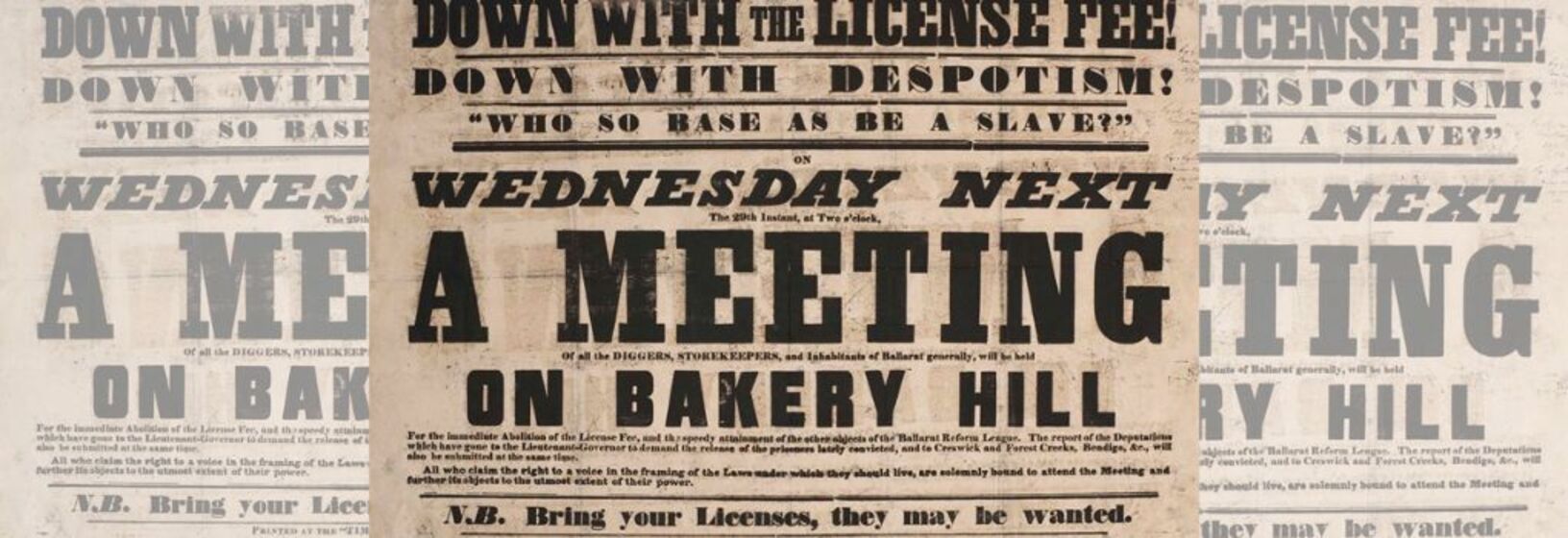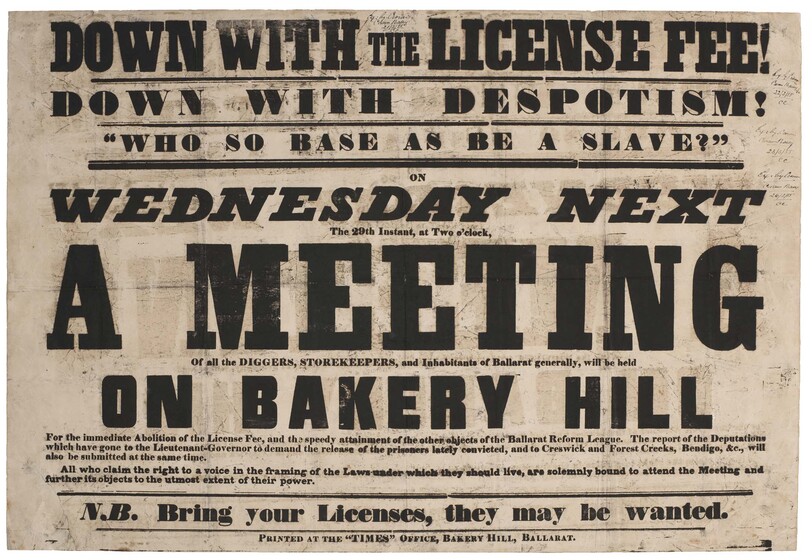Eureka Stories
What is Eureka and what happened there?
In the early hours of 3 December 1854 a force of police and other troops charged a reinforced camp constructed by miners on the Eureka gold diggings. About 150 diggers were inside the stockade at the time of the attack. In the fighting, 4 soldiers and about 30 other people were killed, and another 120 people taken prisoner. Thirteen people from the stockade were charged with treason – these men were either tried and found not guilty, or charges against them were dropped.
Many people think of the Eureka Stockade as a battle between the diggers (rebellious Irish fighting for democracy) and the police and colonial militia (the forces of the British Crown in the Colony). It’s nice to have a single story to make sense of everything. Eureka, however, is not a single simple narrative. Several stories intertwine and involve many of the same people and places. Let’s look at some of them.
The Hated Gold Licences
In 1854, people mining for gold around Victoria had to pay a monthly fee of 30 shillings for the right to mine, regardless of how much gold they found. Someone who had been looking for gold unsuccessfully for months still had to pay the same fee as someone who was pulling out gold by the pound. Diggers argued that it was an unfair tax, imposed on them without their consent, as they did not have the right to vote. (After the Goldfields Royal Commission the licensing fee was changed to a tax on gold when it was being exported.)
Not only did the diggers resent the licence fee, they were angry at the way the goldfields police went about checking that miners had licences. Diggers claimed that police were beating people up or chaining them to trees if they could not produce a licence, and undertaking unnecessary inspections on people they didn’t like. Resentment of the licence fee and the conduct of police in their “licence hunts” was expressed across the Victorian goldfields.
The Unfair Treatment of Diggers by the Police and Justice System
People around the Victorian goldfields were also unhappy with the lack of thoroughness with which police had investigated a number of goldfields crimes. They were concerned about what they thought was the unfair and secretive way people were charged and convicted of crimes. There were claims by people living on the goldfields that it was necessary to bribe police and government officials in order to do business and stay safe. As the goldfields populations increased, tensions between the goldfields communities and police and other government officials rose.
In Ballarat a series of events (a murder, an arrest and a hotel burning) in late 1854 involving police and Ballarat locals led to the arrests of three men for burning down the Eureka Hotel. These arrests caused enormous disquiet in the area, adding weight to calls by the Ballarat Reform League and other organisations around the goldfields for a fundamental change to the system of government in the Colony – the next element in our Eureka story.
Demands for a Democratic Political System
Since the early 1850s people had been calling for the government to abandon the gold licensing system, remove the gold commissioners, and provide the Colony with a better policing and justice system. Despite an investigation by the Victorian parliament into the goldfields in 1853 (a Legislative Council Select Committee) the government did not make significant changes. By November 1854 an organisation called the Ballarat Reform League had formed in response to official inaction and had written a Charter of democratic rights. They organised a "monster meeting" in Ballarat on 11 November 1854, to have it accepted, and met with Governor Hotham on 27 November 1854, to demand his acceptance of the Charter, and the release of the three prisoners charged with burning down the Eureka Hotel.
Population Explosion
The people calling for these changes to taxes, justice and political participation came from many different parts of the world, such as the United States, Canada, England, Ireland, Scotland, Italy, Germany. This corner of South-Eastern Australia was rapidly changing as thousands and thousands of people arrived to search for gold. Many of these people were educated and from middle-class or merchant backgrounds. The domination of squatters running sheep on large land holdings was being challenged by dense populations of people in goldrush regions generating enormous wealth in the colony, and a desire from these recent arrivals to take up land, and have a say in the making of laws.
We have looked at some parts of the Eureka story; at what unfolded around the colony as a result of this mix of people, events and system of government. There are many other stories about Eureka. To find out more, you can explore the stories through original documents at Eureka on Trial.




